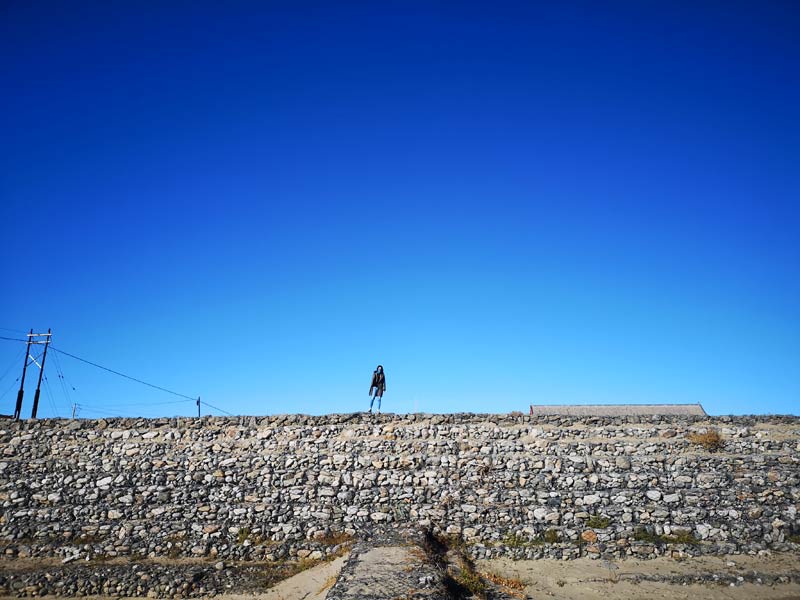

“I broke my leg and couldn’t move. It was getting cold and dark. After calling for help, the only thing in my mind was why I stuck myself in such a remote place,” recalled Zhang Lun (pseudonym), a survivor who in 2014 adventured deep into the Taklamakan Desert, the largest desert in China.
“I wasn’t desperate, because I knew someone would come for me. That I knew!” Zhang told People’s Daily overseas social media. He was rescued 11 hours after calling for help.
His confidence in China’s rescue services isn’t a compliment that came out of nowhere. China has a comprehensive rescue system that includes fire, police, and military departments, with charitable and professional rescue organizations such as Blue Sky Rescue Team as well, who will lend a helping hand whenever and wherever.
In one recent case, a hiker fell down a cliff and broke his neck when hiking across an undeveloped area of the Jiankou Great Wall in southwest Beijing. Due to the steep mountain, the rescue helicopter had to hover above the wall to pick up the wounded hiker, while also making sure the rotor blades didn’t hit any tree branches. It was just one many such rescues.
“Spring and autumn are when we receive a high number of emergency rescue calls from hikers and climbers. Bold outdoor sports enthusiasts take forbidden or uncertain paths in the mountain areas,” Xiao Jidong, deputy director of Shidu police station that conducted the rescue on the Great Wall, was quoted as saying by ThePaper.

(More and more Chinese people are turning into outdoor sports enthusiasts. Photo by Miao Wanyi/People's Daily Online)
China’s outdoor sports enthusiasts grew to number 130 million in 2017, a 12% increase compared to 2016, which also triggered a 64% surge in outdoor accidents. However, such rescue operations are costly in terms of labor and medical resources. Controversy over whether they should be free has sparked a heated discussion, as outdoor sport activities become increasingly popular among young people.
“We immediately started the search and rescue. We knew the hiker’s location, but it still took us more than three hours to reach him in the dark desert night. Fortunately, he’s an experienced hiker and was able to provide useful information. As rescuers, we also risk our own lives on night rescues,” Zhou Yang (pseudonym), who participated in the rescue of Zhang from the Taklamakan Desert, told the overseas social media branch of People’s Daily.
A recent investigative report conducted by China Youth Daily on outdoor rescue showed that 69% of the interviewees think that such rescue operations should not be free, a reminder of the importance that the public attaches to the effective use of public resources and basic safety awareness among hikers.

(More and more Chinese people are turning into outdoor sports enthusiasts. Photo by Miao Wanyi/People's Daily Online)
And many Chinese tourism resorts have taken note.
Yading Scenic Spot in southwest China Sichuan’s Garze Tibetan Autonomous Prefecture recently announced that it would charge 15,000 yuan ($2,165) for a rescue. The move is meant to deter adventurous hikers from hiking into forbidden areas and came after rescuers had to save a string of lost tourists in the region.
Starting at the beginning of this year, Huangshan National Park also announced that it would start charging for rescues, indicating that travelers to the area should be responsible.
“It’s not about trying to make a profit out of our rescue work. We hope that we do not get paid for rescues. We want all travelers to be safe,” Zhou noted.

 Award-winning photos show poverty reduction achievements in NE China's Jilin province
Award-winning photos show poverty reduction achievements in NE China's Jilin province People dance to greet advent of New Year in Ameiqituo Town, Guizhou
People dance to greet advent of New Year in Ameiqituo Town, Guizhou Fire brigade in Shanghai holds group wedding
Fire brigade in Shanghai holds group wedding Tourists enjoy ice sculptures in Datan Town, north China
Tourists enjoy ice sculptures in Datan Town, north China Sunset scenery of Dayan Pagoda in Xi'an
Sunset scenery of Dayan Pagoda in Xi'an Tourists have fun at scenic spot in Nanlong Town, NW China
Tourists have fun at scenic spot in Nanlong Town, NW China Harbin attracts tourists by making best use of ice in winter
Harbin attracts tourists by making best use of ice in winter In pics: FIS Alpine Ski Women's World Cup Slalom
In pics: FIS Alpine Ski Women's World Cup Slalom Black-necked cranes rest at reservoir in Lhunzhub County, Lhasa
Black-necked cranes rest at reservoir in Lhunzhub County, Lhasa China's FAST telescope will be available to foreign scientists in April
China's FAST telescope will be available to foreign scientists in April